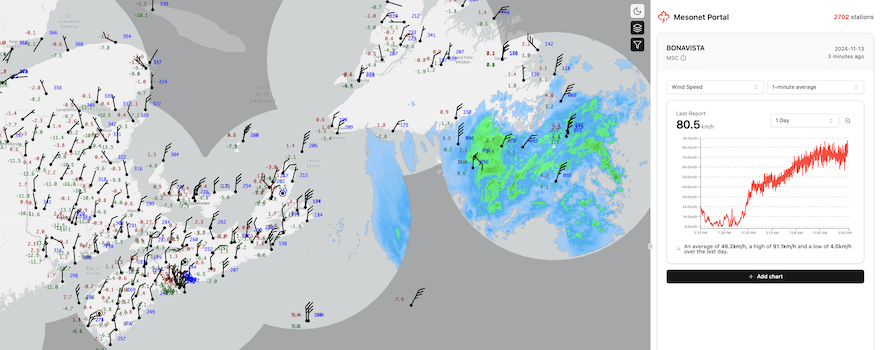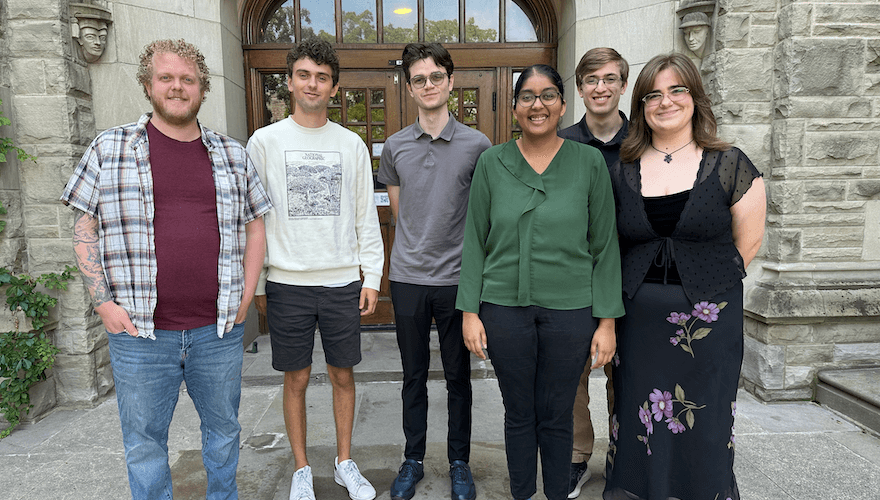CSSL Research Internship

The CSSL Research Internship is designed for students with a strong interest in the analytical side of severe weather studies. This internship provides a unique opportunity to work directly with scientists at the Canadian Severe Storms Laboratory, focusing on data analysis, modeling, and research projects that help us understand severe weather phenomena and their impacts.
As a Research Intern, you will gain hands-on experience with real-world meteorological data, use advanced analytical tools, and contribute to innovative projects addressing severe weather challenges. This internship is ideal for students who are passionate about tackling complex questions and want to develop skills in data analysis, scientific modeling, and critical thinking. This is a great internship for those who are potentially interested in graduate school in the future!
This internship is open to undergraduate (or high school) students in various fields, including but not limited to meteorology, engineering, physics, and environmental science. We welcome applicants from any university and any field who are enthusiastic about research and data analysis.
Available Projects
In addition to the list below, we anticipate selecting one to two research interns for a social science project focused on homeowners' responses to natural disasters. Applicants interested in this specific opportunity should indicate their interest in the "Describe your reasons for wanting to participate in the internship(s) you’ve selected." question on the application.
- Archiving of data from historical Canadian tornadoes.
- Assessing the ability of temporary garages to protect vehicles from hail impacts.
- Assessing tree damage due to hail.
- Automated identification of hail swaths from MESH radar imagery.
- Creation of a warning system based on surface weather observations (Canadian Mesonet Portal).
- Development of a near real-time verification system for NTP/NHP outlooks (Canadian Mesonet Portal).
- Development of NTP/NHP case study capacity using MetPy and PyART.
- Hail soil/ground impacts research.
- Identifying current and historical wind-driven hail events in Canada.
- Lab analysis of hail meltwater samples.
- Machine learning/automated image processing for hail characterization through spatter and impact damage imagery.
- Using machine learning to identify hail (and hail size) from a wave spectrum.
This is not an exhaustive list. If you have suggestions for a project you would like to pursue, we are receptive to those ideas.
Testimonial
I applied to the CSSL research internship following my second year of computer engineering at Western University. Although the field positions sounded engaging, I was considering grad school and wanted to get some research experience beforehand. Western offered various undergraduate research opportunities, but researching tornadoes was very intriguing. Additionally, CSSL listed a wide range of research projects featuring machine learning among other software-related projects, which connected more with my degree and interests.
The best part of the internship for me was being entrusted with an interesting and important real-world problem that had significant implications for analyzing tornadoes. Moreover, I appreciated the independence I was given to direct my research and come to my own conclusions, while still being provided resources and mentorship whenever needed.
Through the internship, I gained valuable research experience and learned how to tackle large complex problems. I improved my ability to communicate ideas to other engineers and researchers, enhancing my communication skills in collaborative environments. Furthermore, I increased my knowledge in machine learning, image processing, and the design of high-performance, reliable software systems.
Due to the success of my research, following my internship, I worked with CSSL to publish a paper on the software I developed. Moreover, I got to present my research at the 16th International Conference on Wind Engineering in Florence Italy, paid for by CSSL. All in all, I would highly recommend CSSL’s internships if you are interested in solving real-world research problems related to severe storms.
Daniel Butt
CSSL Research Intern (2022, 2023)
Research Outcomes
Intern-Led
Manka, K., Butt, D.G., Miller, C.S., & Brimelow, J.C. (2026). Automated hailpad dent detection and segmentation using machine learning. Artificial Intelligence for the Earth Systems. Manuscript submitted for publication.
Slabon, S.G., Neish, C.D., & Miller, C.S. (2025). Synthetic aperture radar as a tool for tornado classification in forested areas. Canadian Journal of Remote Sensing, 51(1).
Butt, D.G., Jaffe, A.L., Miller, C.S., Kopp, G.A., & Sills, D.M.L. (2024). Automated large-scale tornado treefall detection and directional analysis using machine learning. Artificial Intelligence for the Earth Systems, 3(1).
Intern-Supported
Miller, C.S., Kerkhoff, T., Jaffe, A.L., Sills, D.M.L., Kopp, G.A. (2026). Comparing estimated repair costs to EF scale damage assessment for wood-frame houses affected by the 15 July 2021 EF2 Barrie, Ontario tornado. Manuscript in preparation.
Miller, C.S., Jessa, F., & Kopp, G.A. (2025). Evaluating the utility of NDVI as a damage indicator for crops in the Enhanced Fujita scale. Journal of Applied Meteorology and Climatology, in press.
Miller, C.S., Kopp, G.A., Sills, D.M.L., & Butt, D.G. (2024). Estimating wind speeds in tornadoes using debris trajectories of large compact objects. Monthly Weather Review, 152(8).
Sills, D.M.L., Durfy, C.S., & de Souza, C.P.E. (2022). Are significant tornadoes occurring later in the year in southern Ontario? Geophysical Research Letters, 49(4).
Intern-Centered
Miller, C.S., Kopp, G.A., Sills, D.M.L., Brimelow, J.C., Jaffe, A.L., Hamilton, J.R., Eng, S.L. (2026). Training tomorrow’s severe storms scientists: Experiential learning through the Canadian Severe Storms Laboratory’s Internship Program. Bulletin of the American Meteorological Society. Manuscript submitted for publication.
Application
Note that applications open on December 1, 2025; and the deadline for applications is on January 26, 2026. The above links will not work until applications open.
Questions?
If you have any questions, we have made a FAQ page available for you! If you have any further questions that are not answered there, you can feel free to contact the coordinator for CSSL internships, Dr. Connell Miller, at CSSLInternship@uwo.ca.


